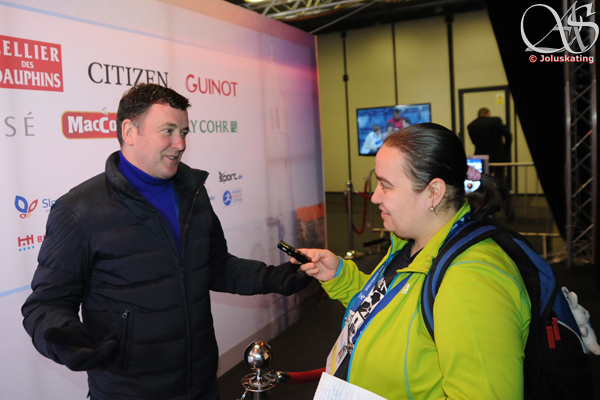Brian Orser: "A champion will have the patience to go back to the basics"
March 22, 2016
By Titanilla Bőd (Új Szó)
Photos © Mireille Geurts, Joy, Keiko Kasai, EMJO, Johanna Welnicki (Joluskating)
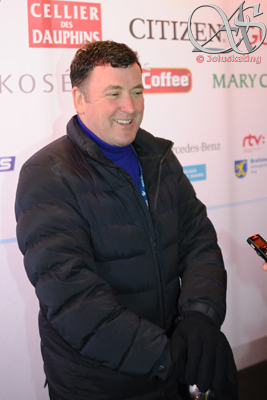 He led Yuna Kim and Yuzuru Hanyu to Olympic gold medals; with this coach, Javier Fernández has become a world and multiple European champion. Brian Orser is currently the most successful figure skating coach. At the European championships in Bratislava he found some time for an interview with Absolute Skating.
He led Yuna Kim and Yuzuru Hanyu to Olympic gold medals; with this coach, Javier Fernández has become a world and multiple European champion. Brian Orser is currently the most successful figure skating coach. At the European championships in Bratislava he found some time for an interview with Absolute Skating.
Former Czechoslovak skater, Jozef SabovčÃk, who skated at the gala in Bratislava, said at a pre-event press conference that he can't wait to meet you again. How do you remember those times when you were competing against each other?
We were more friends than rivals. I met him for the first time in 1981 at the world championships. I remember that in 1984 we were great friends, Scott Hamilton, myself and Jozef. After the 83 season we ran a tour together, we were in Garmisch, having snow-ball fights and lots of fun. We all were medal contenders for the Olympics in Sarajevo and we really were on the podium. That was kind of cool. We've always remained friends and we did lots of shows together. I remember that in 1985 I sponsored Jozef to come to Canada. I completed all the paperwork for my guest. He stayed with me. We were the second and the third at the Olympics but I didn't even see it that way. I saw it as a friend coming over, staying at my house. We trained together, we spent the summer together and that was awesome. We have a lot of great memories. This is great about skating, that our paths are always crossing. I was in Salt Lake City a couple of months ago and got to visit him. I see him at different skating events, too.
SabovčÃk is coaching little children now and he said that in the new judging system a coach has to stand on the ice with a calculator. What do you think about this?
You just have to understand the system and you shouldn't get ahead of your stuff. You always have to teach the skaters young, or if they come later, you have to go back to the beginning and teach them the basics. A good skater, a champion will have the patience to go back to the basics and reinforce their foundation, find their balance. And then we can move forward, then we can start counting numbers and figure out how many points we can get, and where we can get them. 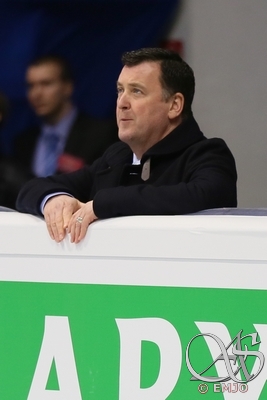 It's not just tactical points, it's also the components, the second mark. Once you have a skater with some good skills, which takes time, a couple of years, then you will start seeing the rewards. Then you can do really cool choreography, because they have a glide, balance, power, they have effortless flow. But that's usually a two-year plan. Lots of kids come, they've seen Javier at a competition, for instance, and they want to skate like that. So they come for a month and they expect to leave looking like Yuna Kim, or Javier Fernández or Yuzuru Hanyu. It doesn't really work that way. It takes some years. For Javier it is a five-year project. Now he is skating quite consistently. We are not perfect in practice every day, but we've come a long way from the first day when he arrived...Late. Lazy. And not motivated. But we all believed in him and he started believing in himself. He actually realized it's not that hard. All the stuff we did with all the basics was pretty easy, so he could do that, he spent a few hours just finding his balance. In the first season when we worked together he made it to the Grand Prix Final, he came third. It's not that hard, you just have to be organized, you have to have a plan and stick to it. I have to get angry sometimes, but not nearly as much as I used to. He is a good kid, he understands the schedule. If he wants to stretch the summer break a little too long, then I try to trick him into coming back early. There is always a way.
It's not just tactical points, it's also the components, the second mark. Once you have a skater with some good skills, which takes time, a couple of years, then you will start seeing the rewards. Then you can do really cool choreography, because they have a glide, balance, power, they have effortless flow. But that's usually a two-year plan. Lots of kids come, they've seen Javier at a competition, for instance, and they want to skate like that. So they come for a month and they expect to leave looking like Yuna Kim, or Javier Fernández or Yuzuru Hanyu. It doesn't really work that way. It takes some years. For Javier it is a five-year project. Now he is skating quite consistently. We are not perfect in practice every day, but we've come a long way from the first day when he arrived...Late. Lazy. And not motivated. But we all believed in him and he started believing in himself. He actually realized it's not that hard. All the stuff we did with all the basics was pretty easy, so he could do that, he spent a few hours just finding his balance. In the first season when we worked together he made it to the Grand Prix Final, he came third. It's not that hard, you just have to be organized, you have to have a plan and stick to it. I have to get angry sometimes, but not nearly as much as I used to. He is a good kid, he understands the schedule. If he wants to stretch the summer break a little too long, then I try to trick him into coming back early. There is always a way.
What is the difference if someone comes to you as a child or later, as an older skater?
If they love skating, if they love to work and are passionate, ready to learn, I don't care what their previous results are. I teach adult skaters, I have some young ones, but to be honest I'm not sure if I'm the best teacher at that development stage. I'm better with somebody more mature, but we have some coaches at the rink who are great at that development. I do have one special little kid, who just turned eleven. He just won the Nationals in Novice, and he can do a beautiful triple Axel and a quad Salchow. He is good, he does all the triples, and triple-triples, he has great spins and he is musical. He is a shining star. But we have to wait two more years before he can go out to junior circuit. So I do have some young ones coming up. I will see that young boy through to Olympics in Beijing, and then I will decide what I'm going to do. Because this job is really hard, on my body, on my head.
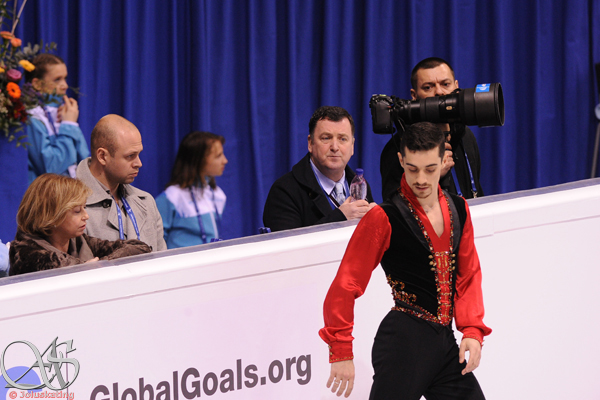
Javi and Yuzuru seem to be completely different characters.
They are. They are completely different, but that makes it easier for me. They are good teammates, they are friendly at the rink, they respect each other. They wouldn't go out to see a movie together or go out with friends, because Yuzu is not that kind of a guy, he would rather stay home and study, as he is in university. He does it all online, so when he is not skating, he is doing that. They have different styles, different temperaments and I have to get to know both of them, I have to be able to read what they're feeling. I tell all my kids that communication is the key. If there is something they are not happy about with me, they have to tell me, and if there is something I'm not happy about I will certainly tell them. They have to communicate what's going on in their life and skating, how they are feeling, so I don't have to try to guess. I have no time to guess. I like to get to it and try to fix it, give them breaks if needed. They have different schedules, some days they skate together, other days they need to be apart.
I remember a story that when Yuzuru first came to you he did not understand almost anything that was said, but you realized that quite quickly... 
Yes, he kept nodding, he kept saying: "Yeah, yeah, yeah. Yeah, yeah, yeah." So for me, "yeah, yeah, yeah" now means "no".
Was it hard to communicate with him in the beginning?
It was. Now I can be honest and comfortable to ask: "Yuzu, do you actually understand what I'm talking about?" Because I tell him to do a flip and he will do a loop, something completely different, but he'll be nodding his head. Now his English is better, because he is studying English, so it's much easier now. And I'm also comfortable when I really have to ask if he is sure what I'm talking about.
Did you use a translator at the beginning?
No. But the skating language is universal. As far as technique goes, it's easy to discuss. When we are talking about strategies and plans, then it gets tricky. When I have to explain why you need to skate this day and not that day, or why you need to do a run-through today, it's more difficult. I don't want them to guess, the psychology has to be very clear.
This season Javi uses Malaguena for his short program and Yuzuru has the Seimei long program. Was it an intention to choose something characteristic for their nationality and identity?
It just happened by chance. Javi has always wanted to do something with Antonio Najarro and this seemed to be the right year to do it. We actually thought about it last year, but then the short dance was paso doble, so everybody was fed up with flamenco and paso doble music, so we waited a year. And with Yuzuru, he found this Japanese music, the story, the movie and he felt so strongly about it. At first, when I heard the music I wasn't a hundred per cent sure, but then Shae-Lynn [Bourne] did some magical editing. They went through many versions until they got the right one, because there are some great pieces of the music we never used, just because Yuzu had a bad feeling about it. Or it didn't match the rhythm of his jumps, he said, it is great but I can't do a quad toe to it, it's too fast, too powerful, it makes my heart go too fast. However, the result is a masterpiece, isn't it?
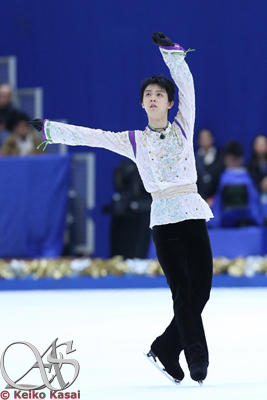

How important is it to you to pass the 100-point mark in the short and the 200-point mark in the long?
It seems to be the theme of this season. It started with Yuzu at the NHK and the Grand Prix Final, but then Javi did his thing in the Final, in the free program he got over 200 points. That was exciting. I think it was a little bit overshadowed by Yuzu's masterpiece, however, if that was on his own it would be remarkable. I think we will see a similar performance from him tonight. [The interview was made on the morning before the free skate in Bratislava. Javier was not flawless, but still earned 200.23 points in the free program.] Ten days ago we were having really rough times, rough practices and some really emotional communication. Not yelling or screaming, just Javi was getting nervous and there was some fear. But the thing is that he expresses it, he talks about it and he is realistic about it. He remains reasonable and that's how we get through it.
Do Javi and Yuzu inspire each other? Do they push each other? 
They inspire each other more than push each other. They have a lot of respect for each other. When we have a practice at home together, if Javi falls and Yuzu is skating by, he'll stop and pick him up. At the beginning of the season Javi was trying to get through the long program, that last forty-five seconds, which is a killer, and Yuzu was clapping for him with all the other coaches and skaters: "Come on, Javi, come on, Javi!" And he does the same for Yuzu. If Yuzu falls down, Javi picks him up. When Yuzu was trying to get the three quads in the long program, the second quad toe, after the halfway point, for most of our training season was not happening. He was just not finding his rhythm. And he even asked Javi: "Javi, how do you do that third quad?" And Javi was like: "Yuzu, just put it out of your mind. You just have to breath and just do it. Don't think about it." And then he started landing it. So, they are good together. I think it also gives some comfort to them. If you are training along somebody that's going into the same place, the Olympics, Worlds, you get comfort when you have somebody else around, who is going through the same, the same stress, the good days, the bad days.
Do you think only these three skaters, Javier, Yuzuru and Patrick Chan are capable of such high-scoring programs, or there are some other guys?
Shoma Uno is also good and I've seen some young talent here. The short program was amazing, the Belgian boy [Jorik Hendrickx], the other Spanish boy [Felipe Montoya] was great, the Israeli boys [Alexei Bychenko, Daniel Samohin] were great. There was some really good skating! And entertainment as well, I could hear the audience. It's so nice to see the audience getting into it.
Javi talked about the evolution of the sport at the press conference and he said the triples might disappear or the ISU might create a new rule that only three quads are allowed in a long program. What do you think will happen?
One day maybe the triples will disappear. People were marveling at triple Axels when I first started doing them, all the media was going crazy about that. I landed a triple Axel at practice and people would go crazy. And now somebody does a triple Axel and it's normal. It's incredible how much has happened in 25 years. So who knows what's going to happen in the next 25 years?
